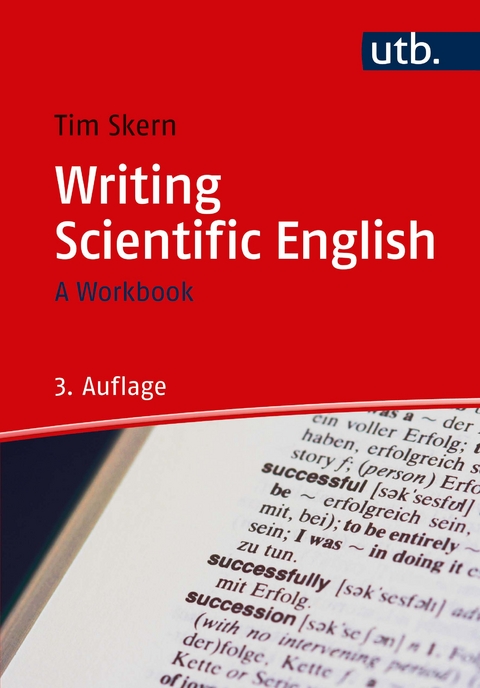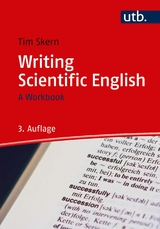Writing Scientific English
UTB (Verlag)
978-3-8252-5066-9 (ISBN)
Success in science depends nowadays on effective communication in English. This workbook is specifically designed to give under- and post-graduates confidence in writing scientific English. Examples and exercises show how to avoid common errors and how to rephrase and improve scientific texts. The generation of a model manuscript enables the reader to recognise how scientific English is constructed and how to follow the conventions of scientific writing. Guidelines for structuring written work and vocabulary lists will encourage young scientists to develop a concise and mature style. The workbook is accessible to students of many fields, including those of the natural and technical sciences, medicine, psychology and economics.
Tim Skern, native English speaker, studied biochemistry in Liverpool and London. Now working at the Max F. Perutz Laboratories, he has been teaching scientific English at the University of Vienna and the Medical University of Vienna since 1992.
Chapter 1 An introduction to scientific English 15
1.1 Advantages and disadvantages of English 15
1.2 Formal English, the language of science 21
1.3 Words for writing scientific English 31
1.4 Take-home messages from Chapter 1 34
1.5 References 34
1.6 Improvements to exercises 34
Chapter 2 Writing clear scientific English 37
2.1 Eight guidelines for improving your writing technique 37
2.2 Just to make you feel better 45
2.3 Take-home messages from Chapter 2 48
2.4 References 49
2.5 Improvements to exercises 49
Chapter 3 Applying the fundamentals 51
3.1 Summarising the text “Fighting for Breath” 51
3.2 Improving four summaries of “Fighting for Breath” 54
3.3 Writing abstracts for scientific presentations 63
3.4 Improving four abstracts 64
3.5 What is science? 74
3.6 Improving four texts on “What is science?” 78
3.7 The five most common commands and comments from improved texts in Chapter 3 86
3.8 Take-home messages from Chapter 3 87
3.9 References 87
Chapter 4 Constructing a scientific manuscript 89
4.1 The process of publishing original data in a scientific manuscript 89
4.2 Planning a scientific manuscript 95
4.3 Writing a scientific manuscript 99
4.4 Assembling and improving the model manuscript 122
4.5 Editing and refining a scientific manuscript 129
4.6 Take-home messages from Chapter 4 134
4.7 References 135
Chapter 5 Practising writing and improving scientific manuscripts 137
5.1 Improving the quality of bread 137
5.2 Your views on human activity and global warming 147
5.3 Measuring biodiversity 151
5.4 Stereotypic Man 157
5.5 Searching for the best firewood to reduce global warming 163
5.6 Is there a connection between eating organic food and cigarette smoking? 168
5.7 The six most common commands and comments from improved texts in Chapter 5 175
5.7 Take-home messages from Chapter 5 175
5.8 References 176
Chapter 6 Easing the pain: writing whilst researching 177
Chapter 7 On your own 181
7.1 Resources 184
7.2 The comments that I use to correct texts in my course 187
7.3 A reading list to improve your vocabulary and your scientific writing 188
7.4 Some tips for oral presentations 199
7.5 References 199
Chapter 8 The scientific vocabulary of this book 201
8.1 Linking words 201
8.2 Words from the basic scientific lexicon 202
8.3 Words that extend the basic scientific lexicon 204
8.4 Exercises using texts from Nature and Science 205
8.5 References 209
8.6 Words that you wish to add 209
lt;p>Aus: KARDIOTECHNIK 2/2013- Johannes Gehron
[...] Skern beschränkt sich im gesamten Buch nicht nur auf den Textinhalt, sondern ist absolut zielorientiert: In allen Kapiteln wird der Leser zum Entwurf eines wissenschaftlichen Artikels hingeführt.[...]
Aus: STANDARD, Klaus Taschwer, 04.03.2009
Dem Verbessern von Texten und ihre "Ökonomie" gilt Skerns Hauptaugenmerk - sowohl im Kurs wie auch im Buch: Entscheidend für die Annahme eines Manuskripts sei nicht zuletzt, dass die Inhalte in möglichst knappen Worten vermittelt werden. Und das bedeute mitunter harte Arbeit, ganz gemäß Skerns immer wieder gepredigtem Mottos: "The first draft is never the last."
» Zum Volltext der Rezension
Aus: Nachrichten aus der Chemie | 58 | | www.gdch.de/nachrichten, Terence Mitchell, 01.04.2010
[...] Das Buch ist sehr gut geschrieben und aufgebaut: Es nutzt denjenigen, deren umgangssprachliches Englisch gut ist, die sich aber beim Verfassen wissenschaftlicher Texte unsicher fühlen. [...] Fazit: Das Buch von Skern ist sehr zu empfehlen [...]
| Erscheinungsdatum | 09.10.2019 |
|---|---|
| Reihe/Serie | UTB Uni-Taschenbücher |
| Verlagsort | Stuttgart |
| Sprache | englisch |
| Maße | 150 x 215 mm |
| Gewicht | 329 g |
| Themenwelt | Sachbuch/Ratgeber ► Beruf / Finanzen / Recht / Wirtschaft ► Bewerbung / Karriere |
| Schulbuch / Wörterbuch ► Wörterbuch / Fremdsprachen | |
| Naturwissenschaften | |
| Sozialwissenschaften ► Pädagogik | |
| Schlagworte | Anleitung • Arbeitsbuch • biodiversity • Englisch • Englisch schreiben • English • English Language • English the language of science • Formal English • Lehrbuch • linking words • mündliche Präsentation • Schlüsselkompetenz • Schreibhilfe wissenschaftlich Schreiben • schriftliche Präsentation • Scientific Writing • Scientif manuscript • UTB • vocabulary • Wissenschaftliche Arbeit • Wissenschaftlich schreiben • Writing in English • Writing Scientific English |
| ISBN-10 | 3-8252-5066-0 / 3825250660 |
| ISBN-13 | 978-3-8252-5066-9 / 9783825250669 |
| Zustand | Neuware |
| Informationen gemäß Produktsicherheitsverordnung (GPSR) | |
| Haben Sie eine Frage zum Produkt? |
aus dem Bereich




